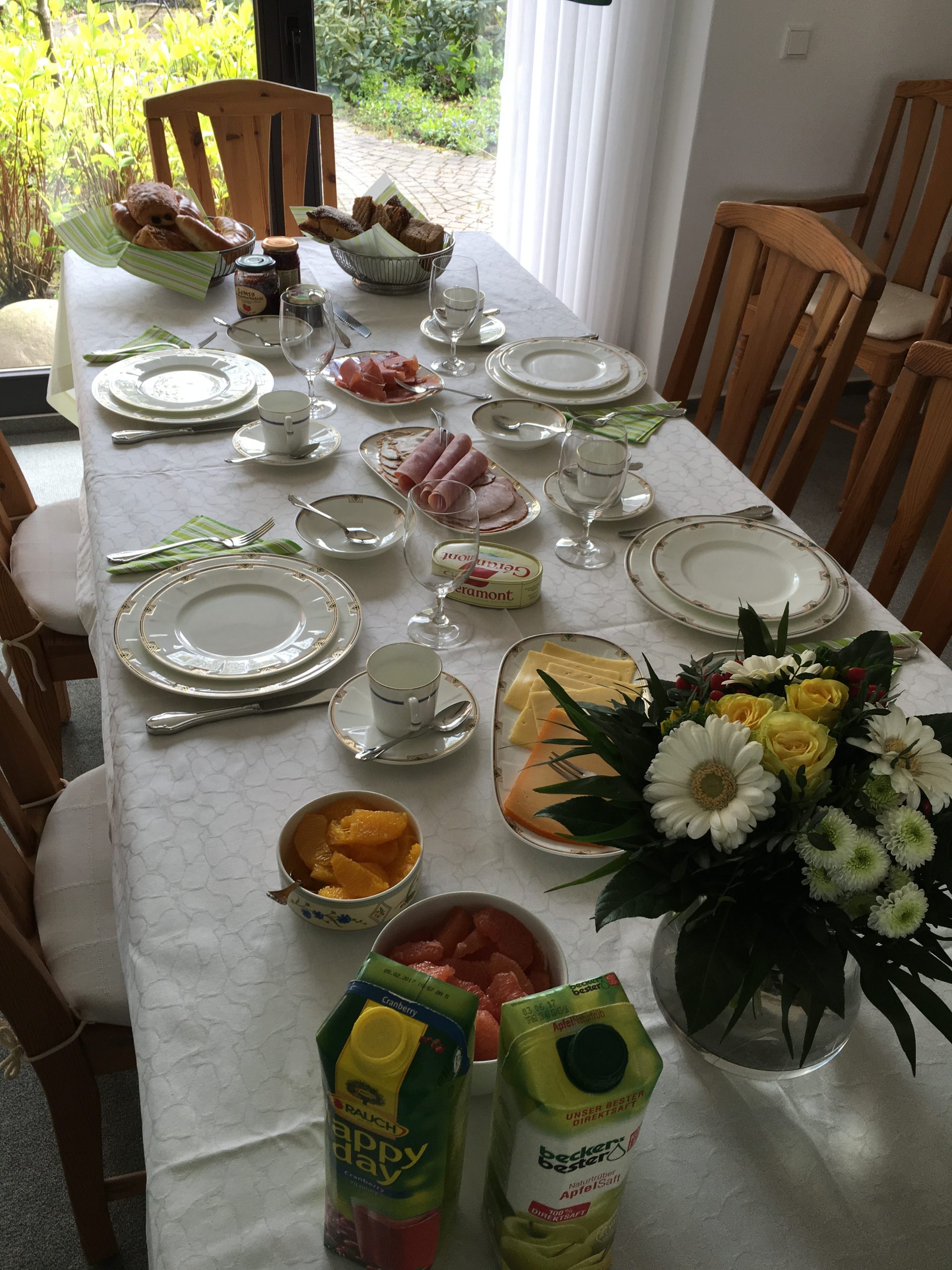Einheit 4.2 (online)
Das Frühstück
  |
“Frühstücken wie ein Kaiser, Mittagessen wie ein König und Abendessen wie ein Bettler.”
This old German saying indicates that breakfast is considered a very important meal in the German-speaking countries. About three quarters of the population eat breakfast every morning (81% in Germany, 77% in Austria, 65% in Switzerland). The word Frühstück can be traced back to the 15th century and means something like the first piece of bread that is eaten in the morning. The English equivalent “breakfast” refers to breaking the nightly fast. Most people think eating breakfast provides them with energy to start their day, helps them to concentrate on their work or studies, and to perform well. Many people also see it as a social opportunity to spend time with their family before a busy workday while others spend some time reading the newspaper, checking emails, or planning their days. The most common beverage at breakfast is coffee and tea for adults, whereas children usually drink milk, cocoa, juice or water. Bread or rolls, butter, jam, honey, Nutella, cold cuts, cheese, fruit and cereal are the staple of most breakfasts. Some people only eat sweet things for breakfast (jam, honey, Nutella, cereal), while others prefer more savoury toppings for their bread. And yet others like to mix. On the weekend, people often take more time for their breakfast or even extend it into a brunch, and add eggs in various forms to their meal. See the videos in the “Zum Spaß” section for more information about “Frühstück”. |
![]() Übung 1. Ziehen Sie die Substantive auf den richtigen Artikel.
Übung 1. Ziehen Sie die Substantive auf den richtigen Artikel.
![]() So frühstückt Deutschland: Die Nutella Frühstücksstudie 2015 zeigt uns, wie Leute in Deutschland ihren Tag beginnen (© Nutella)
So frühstückt Deutschland: Die Nutella Frühstücksstudie 2015 zeigt uns, wie Leute in Deutschland ihren Tag beginnen (© Nutella)
![]() Mein Tagesablauf. Hören Sie zu und beantworten Sie die Fragen.
Mein Tagesablauf. Hören Sie zu und beantworten Sie die Fragen.

Rolf und Marita |
|
|
|
|

Sebi |
|
|
|
![]() Grammatik
Grammatik
Reflexive Pronouns in the Accusative
Please work through the following presentation to learn about reflexive pronouns in the accusative.
![]() Übung 2
Übung 2
![]() Was machen Sie an einem typischen Tag? Schreiben Sie 5 Sätze über Ihren Tagesablauf und bringen Sie die Sätze mit in die nächste Deutschstunde.
Was machen Sie an einem typischen Tag? Schreiben Sie 5 Sätze über Ihren Tagesablauf und bringen Sie die Sätze mit in die nächste Deutschstunde.
![]() Wortschatz in Quizlet:
Wortschatz in Quizlet:
![]() Was wissen Sie jetzt? Klicken Sie hier für Quiz 4.2.
Was wissen Sie jetzt? Klicken Sie hier für Quiz 4.2.
Extra Practice (optional):
![]() Deutschtrainer
Deutschtrainer
If you want to practice vocabulary from todays lesson, click on the topic below. Watch the video and then click on “start” under the video and do the exercises.
![]() SpraKuKo
SpraKuKo
Here is a PDF that you can print and add to your notes. It contains more examples about daily routine.
Media Attributions
- Frühstück © csawatzky is licensed under a CC BY-NC-SA (Attribution NonCommercial ShareAlike) license
- star © IO-Images is licensed under a Public Domain license
- book © IO-Images is licensed under a Public Domain license
- headphones © IO-Images is licensed under a Public Domain license
- Rolf und Marita © ckost is licensed under a All Rights Reserved license
- Sebi © ckost is licensed under a All Rights Reserved license
- pen © IO-Images is licensed under a Public Domain license
- link © IO-Images is licensed under a Public Domain license
- check mark © janjf93 adapted by Solomon Hajramezan is licensed under a Public Domain license
- pdf © IO-Images is licensed under a Public Domain license
Emporer
King
beggar

